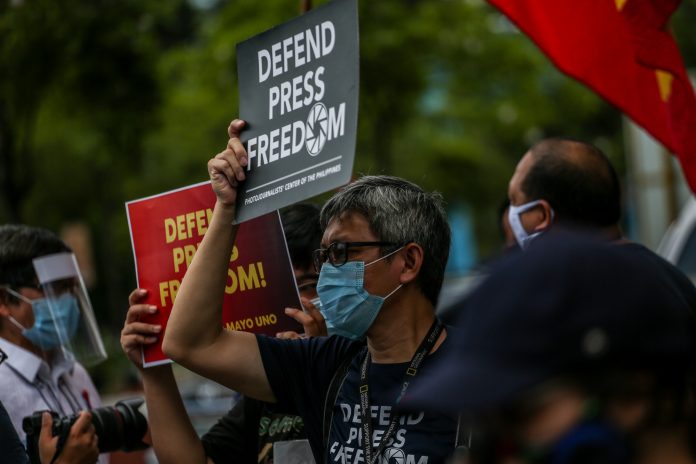President Rodrigo Duterte’s key allies in Congress showed their true intent in holding back the franchise renewal of the Philippine’s biggest broadcast network. They want to dictate the terms of news coverage.
While the current target is ABS-CBN, statements by legislators during the July 6 hearing indicate a desire to trap news outfits behind the steel bars of state-controlled news management.
The government closed down ABS-CBN’s free broadcast service in May, following the expiration of its franchise. Bills for an extension of its renewal had sat in Congress for years.
Standard practice has been to allow operations to continue until the legislature completes proceedings with a vote.
Other broadcast networks, including those owned by Catholic institutions, were granted that grace period. Not ABS-CBN.
The National Telecommunications Commission, facing threats of graft charges from President Duterte’s top lawyer and legislators shuttered not only the network’s free service, but also its satellite and digital TV services that consumers pay for.
That has cost the corporation US$709,000 in daily losses from advertising and other revenues, hampering its capacity to pay wages of 11,000 regular and project-based workers.
It has also deprived 69 million Filipinos — two of three viewers — of the network’s news, analysis, commentary and public service, according to Integrated News chief Regina Reyes.
Top officials of the executive and legislative branches have insisted the multi-pronged attacks on ABS-CBN have nothing to do with press freedom, although President Duterte has publicly vowed to shove the network off the airwaves.
But one after another, state agencies refuted a series of claims bannered to justify rejection of a franchise.
Regulatory officials told Congress the network had clearance for its securities offerings and its tax payments. Neither had any government body ordered a halt to its technological innovations.
There are pending labor issues, similar to what other big broadcast firms face, but these are being heard by either the Labor department or the courts.
During the July 6 hearing, legislators took up earlier claims by President Duterte’s key aides and supporters about biased coverage of the 2016 national elections and on other hot public issues.
The Commission on Elections, which monitors news and advertising placements during election season, and the Kapisanan ng Mga Brodkaster sa Pilipinas, a self-regulating body of the broadcast industry, said there were no formal complaints lodged against the network.
That did not appease President Duterte’s allies. One by one, they whined about headlines, about reports that went beyond stenographic sharing of press releases and statements, about factual if critical articles that highlighted the contradictions between official claims and actions.
Legislators sermonized like gatekeepers who had chucked manual of standards and ethics, lumping commentaries with news, demanding why their press releases did not make the cut.
Deputy Speaker Rodante Marcoleta complained about news reports on killings, totally ignoring the fact that the official kill count for President Duterte’s drug war was edging towards 6,000 with triple that number of murders ascribed to unknown vigilantes or gangs.
He also complained about rape stories, which have featured President Duterte’s attitude toward women and, lately, the killing of a minor hours after she reported rape in the hands of two police officers.
Worse, another legislator pushed that any new franchise would need “parameters of compliance” that could lead thin-skinned news subjects to dictate how the network has to present their side, with little room for professional judgment calls or fact-checking claims.
Legislators’ arguments were similar to those raised in two previous national administrations by advocates of the “Right of Reply.”
Those proposed bills, roundly trashed by most of the country’s media groups and companies, wanted political actors the power to dictate air space or column inches for their positions. These would have hampered newsrooms’ capacities to hold those in power accountable.
Former representative Erin Tañada, the author of previous Freedom of Information measures, warned that legislators wanted to resurrect the old, failed attempts to control news into the network’s franchise.
“This is unfair because the other franchises Congress approved did not include this proposal,” said Tañada. He may only be partly right. A precedent could encourage a government skilled at weaponizing the law to hold this as a sword over other news outfits.
There is no question about Congress’ constitutional power to grant franchises for the use of airwaves. But the attempts of this Congress to link a franchise to censorship and force a network into the straitjacket of prior restraint violates a constitutional provision high on the Bill of Rights – the right to press freedom.
President Duterte’s Congress may vote to kill a network. They have also killed any pretensions about the Philippine press being free.
Inday Espina-Varona is an award-winning journalist in the Philippines. She is a recipient of the “Prize for Independence” of the Reporters Without Borders in 2018.
The views expressed in this article are the opinions of the author and do not necessarily reflect the editorial stance of LiCAS.news.









